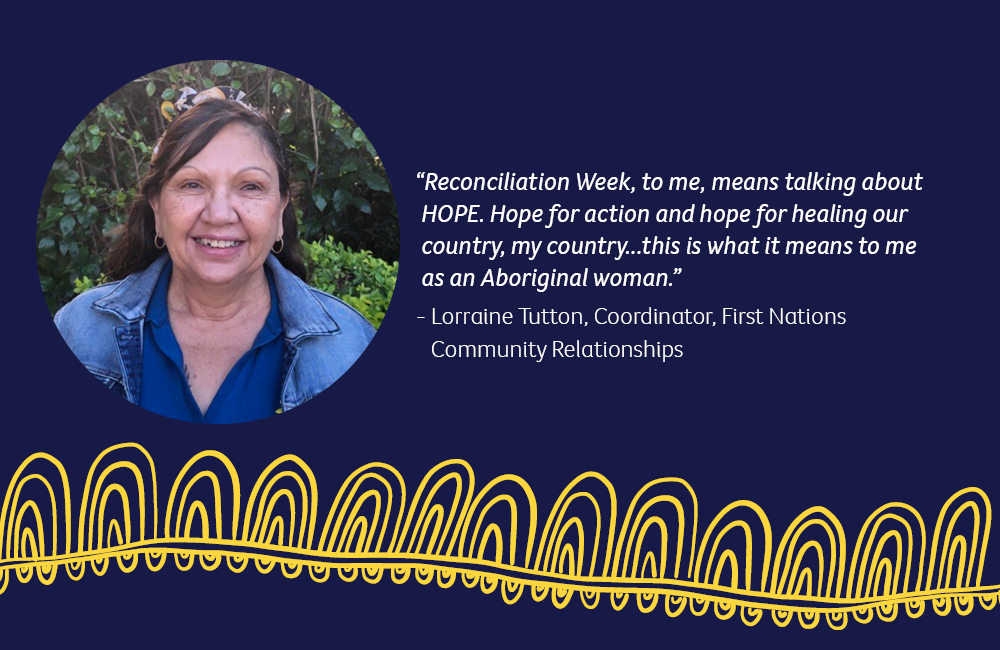This week, (May 27 to June 3) marks National Reconciliation Week (NRW), a time for all Australians to learn about our shared histories, cultures and achievements, and to explore how each of us can contribute to achieving reconciliation in Australia.
Reconciliation Australia’s theme for 2021, More than a word. Reconciliation takes action, urges the reconciliation movement towards braver and more impactful action.
Cancer is the second most common cause of death for Aboriginal people, who are 30% more likely to die from the disease than non-indigenous Australians. Cancer Council Queensland is working to take action, by undertaking targeted research aimed at achieving health equality for Aboriginal and Torres Strait Islander peoples by gaining a better understanding of how and why cancer affects these groups.
Cancer Council Queensland Senior Researcher, Professor Peter Baade, said they are investigating several key questions at present, aimed at highlighting important disparities faced by Aboriginal and Torres Strait Islander people.
“We’re currently looking at how patterns of cervical screening among Aboriginal and Torres Strait Islander women vary by geographical area, including the importance of Aboriginal Controlled Community Health Organisations and quantifying the survival disparities faced by Aboriginal and Torres Strait Islander people diagnosed with cancer,” Professor Baade said.
“We’re hoping these research initiatives will provide greater understanding on where evidence-based interventions need to be targeted.
“Once results from this research are available, Cancer Council Queensland will partner with Aboriginal and Torres Strait Islander organisations to develop effective methods to communicate findings widely, so they can be used to motivate and guide interventions to reduce these disparities.”
Reconciliation is a journey for all Australians – as individuals, families, communities, organisations and importantly, as a nation. At the heart of this journey are relationships between the broader Australian community and Aboriginal and Torres Strait Islander peoples.
Cancer Council Queensland First Nations Community Relationships Coordinator, Lorraine Tutton said NRW is about hope, action and healing.

“It’s crucial that as a not-for-profit and nation as a whole, everyone takes time to sit down and chat with local Elders or Aboriginal peoples in their local community, to make connections and see how we can all work together towards reconciliation,” said Lorraine.
We all have a role to play when it comes to reconciliation, and in playing our part we collectively build relationships and communities that value Aboriginal and Torres Strait Islander peoples, histories, cultures, and futures.
Reconciliation must live in the hearts, minds and actions of all Australians as we move forward, creating a nation strengthened by respectful relationships between the wider Australian community, and Aboriginal and Torres Strait Islander peoples.
Cancer Council Queensland services are accessible for Aboriginal and Torres Strait Islander people and we are continually striving to make more services accessible for those residing in regional and rural areas.
To access key cancer information for Aboriginal and Torres Strait Islander peoples, see here.
References:
- AIHW 2020. Aboriginal Torres Strait Islander health performance frame work report 2020 (https://www.indigenoushpf.gov.au/measures/1-23-leading-causes-mortality/data#DataTablesAndResources)
- AIHW 2020. Aboriginal Torres Strait Islander health performance frame work report 2020 (https://www.indigenoushpf.gov.au/measures/1-08-cancer#:~:text=AIHW%20and%20ABS%20analysis%20of,164%20per%20100%2C000%2C%20respectively)

